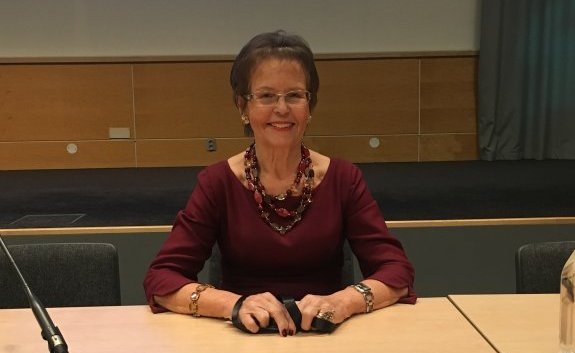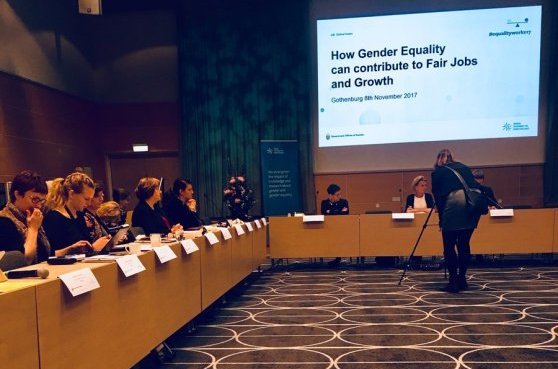How can gender equality be a key to fair jobs?
Blogpost by Elvy Svennerstål

[Speech of EWL Vice President Elvy Svennerstål at the Ministerial Conference on How Gender Equality can contribute to Fair Jobs and Growth, 8 November] Our Vice President Elvy Svennerstål from the Swedish Women’s Lobby, is at the Ministerial Conference on How Gender Equality can contribute to Fair Jobs and Growth. Taking place in Gothenburg, Sweden, this conference brings together Ministers responsible for Gender Equality from several EU Member States, as well as representatives of the EU institutions, the social partners, civil society and researchers active in the field. It has been organised by the Swedish government ahead of the Social Summit on Fair Jobs and Growth taking place in Gothenburg on November 17th. Elvy is speaking on the panel about ‘Gender Equality - A Key to Fair Jobs.’
Speech of Elvy Svennerstål at the Ministerial Conference on How Gender Equality can contribute to Fair Jobs and Growth
How can gender equality be a key to fair jobs?
On behalf of the European Women’s Lobby (EWL), I would like to express my appreciation for the invitation from the Swedish Government for women’s movements to join this special high-level event focusing on gender equality. It inspires me to emphasise one of our key demands – to bring gender equality and women’s rights back to the core of the EU. It’s our Europe too!
The concept of growth – inclusive growth
In 1776 Adam Smith came up with the rational man – unemotional – driven solely by his needs. This has been the model steering societies, systems and entire economies. It is a model that no longer meets the needs of the modern world where we want women and men to be equal earners, carers and actors in all aspects of real life.
Massive investments in the care economy
So invest in the care economy! This is an area where the unpaid work of women is a major barrier to women’s participation in the labour market and subsequent economic growth. A strong care sector can create job opportunities for many men and women and gives women – otherwise tied to unpaid care work - the opportunity to find paid employment, pay tax, and help grow the economy.
However, jobs in the care sector are still underpaid and undervalued. Work in the care sector has to be treated with the same respect and urgency as work in other sectors – like technical work and scientific innovation. Developing the care sector must also tackle gender segregation and attract men as well as women, re-evaluate care work, create quality jobs and must be a part of a fair job strategy as well as an inclusive growth strategy.

- EWL Vice President Elvy Svennerstal at the Minister Conference on gender equality and fair jobs, Gothenburg, 8 November 2017
Pay, pensions & poverty
Consistent gender gaps in pay are a basis for greater gaps in pensions and even lead to poverty and are in contradiction with an inclusive growth model.
As the labour market is highly gender segregated, we should define “work of equal value” to make sure that the playing fields are equal for both sexes.
We call for a revision of the equal pay provisions as contained in the Recast Directive, Chapter 1, Article 4 concerning Equal Pay, to the effect that work of equal value is legally defined.
We also call for every Member State to set an annual reduction of the gender pay gap target of 5-10% and this should be recommended in the European Semester country-specific recommendations and it should be monitored.
We also call for an EU-indicator to measure the gender pension gap, and we recommend all Member States to reduce the gender gap in pensions as part of on-going pension reform policies.
Gender Budgeting
How are public resources allocated to women and to men? How much Structural Funds, Cohesion Funds, Common Agricultural Policy Funds, EIB Investment Funds etc. go to benefit women and to men? Gender budgeting is an effective tool to determine if the government’s gender equality ambitions have truly been translated into budgetary decisions. EU institutions have an opportunity to make this happen in the forthcoming Multiannual Financial Framework (MFF), which will decide the future spending of the EU.
Eradicate men’s violence against women – including sexual harassment in the workplace
An inclusive growth model places the eradication of male violence against women at its core. The #MeToo campaign and the European Parliament’s Resolution on Combating Sexual Harassment and Abuse in the EU, testify that sexual harassment in the workplace is rife – there are EU laws that should be used to combat this – they need to be respected!
We call on the EU and all Member States that have not yet done so to ratify the Istanbul Convention.
We call on the European Commission to carry out a review of implementation of the EU Recast Directive, particularly article 2c) and d), referring to harassment and sexual harassment.

- Ministerial Meeting on gender equality and fair jobs, 8 November 2017
Political strategy for equality between women and men
Finally, we need a Political strategy for equality between women and men (post 2019). Without a strategy the EU cannot hope to meet its legal commitments to achieve gender equality. In 2015, a majority of Member States supported such a Strategy and the Trio Presidency Declaration from July underlines this need.
Sustainable resources to women’s movement
The civil society has an important role to urge and promote political change, and to hold governments and the EU responsible for their commitments.
During the last decade, the women’s movement has had to cope with a backlash against women’s rights in the rise of sexism, racism, homophobia, populism and extremism. At the same time, it has been seriously underfunded. The women’s movement is an indispensable part of a democratic society, whose specific funding and support it needs.
A European Women´s Caucus
The EIGE index shows that not all women in the EU have equal rights. The employment rate of women with disabilities, older women, migrant women, remains low. We need specific measures to bridge these gaps. We need to ensure that refugees and asylum seeking women have the same possibilities to achieve economic independence on an equal playing field with men.
When the EU is discussing its future, women must be at the heart of the Future of Europe debate. Women from all sectors, political parties, business, civil society must have their voices heard. We invite you to initiate a European Women’s Caucus to discuss together with you the Europe we want: care, resilience, equality and a sustainable economic model that works for all.
Read here the conclusions and more information on the Ministerial Meeting .




